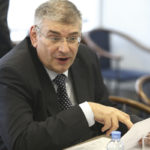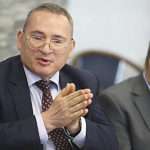It would be advisable to reduce the key rate to 4 percent and to allocate a significant part of the foreign exchange reserves to the implementation of breakthrough projects, said Sergei Bodrunov, President of the Free Economic Society of Russia, Director of the S.Yu. Witte Institute of New Industrial Development at a Rossiyskaya Gazeta Business Lunch event. It was held on the eve of the Fourth St. Petersburg International Economic Congress dedicated to the future of the new industrial society.
 Alexey Savin
Alexey Savin
Deputy Editor-in-Chief of Rossiyskaya Gazeta
 Sergey Bodrunov
Sergey Bodrunov
President of the FES of Russia, Director of the S.Yu. Witte Institute of Industrial Development, Doctor of Economics, Professor
Five Percent
Rossiyskaya Gazeta: Sergei Dmitrievich, what economic growth rates are needed to ensure decent living standards in Russia?
Sergei Bodrunov: I think that at least 4 to 5 percent per year. Let me remind you that we already had such growth. Regaining it will be a complex task, it cannot be done in one fell swoop.
But, generally, I do not support the idea of evaluating the economy only by the size and dynamics of GDP, because not all aspects of GDP are equally useful. If you start pouring water from one glass into another, the statistics will record it as the provision of additional services to be taken into account in the calculation of GDP. What we need is not just growth but, I would say, a restructuring of GDP in favor of high-tech products which will form the basis for a future breakthrough. Restructuring is more important.
We need to look for points or centers around which economic potential and economic growth could crystallize. They can be in the form of special clusters or certain activities, like, for example, digitalization or technologies of trust, which drastically reduce transaction costs. Simply put, instead of simply producing flat irons and teapots, we must produce ultramodern “flat irons” and “teapots”; we need to maintain a dialogue with the future and understand future needs. I believe positive development can be achieved without any GDP growth, and vice versa.
WE NEED TO LOOK FOR POINTS AROUND WHICH ECONOMIC GROWTH COULD CRYSTALLIZE.
Catching Up Is Harder Than Keeping Up
RG: We often hear calls to restore the industry that was destroyed in the 1990s. There are estimates that say the production capacity has shrunk 30 percent over the last 25 years, like in the postwar period. What do you think?
Sergei Bodrunov: We (the Institute of New Industrial Development — Editor’s Note) have made the same assessment, it’s worse than the aftermath of Mamai’s inroads. We did not only suffer setbacks in the volume or structure of industry, the problem runs deeper, we have suffered a slowdown and it is much more serious than the visible side of the de-industrialization that occurred due to the severance of economic ties and the pursuit of the liberal-monetarist model of the 90s. Unless the industrial base is upgraded, it is impossible to move forward, and from that perspective catching up is always harder than keeping up. I have always advocated a return to the priority of industrial development, it is required by this country’s specific conditions. Otherwise, we start teetering and groping for external supports. The economy has been brought to a state where we have lost the lion s share of industry.
First, there was not enough money, then, in the early 2000s, the windfall of petrodollars hit the economy, but we got carried away filling foreign exchange reserves. Now the reserves (455 billion dollars. — Editor’s Note) cover all possible risks several times over. Even if you top them off with something completely unforeseen, 120- 150 billion dollars will be enough. The remaining funds should be directed to re-industrialization, which is connected with new technologies. I mean, if we want to rebuild the industry, it does not mean we are about to recreate the Soviet industrial base; in fact, what we need to create is a new industry, a modern one in terms of both technology and the type of organization, and also in terms of «ideology» if you will.
Trial by Low Inflation
RG: You are talking about possible additional trillions of rubles from reserves, but, generally speaking, there is money in the economy, it just doesn’t turn into investments. Even despite the achievement of an unprecedentedly low inflation rate. What is the reason for this?
Sergei Bodrunov: Our assumption that investments would pour down on us as soon as we reined in inflation proved to be wrong. What has happened is what had already happened to Russia many times: the money earned within the economy has been siphoned off abroad through certain mechanisms. It is like a tribute to the Golden Horde in the Middle Ages, only the khan is replaced by the Western countries, China, and those parts of the world where Russian businessmen keep their profits and from where everything is imported, from the simplest products to tomographic scanners.
THE MONEY EARNED WITHIN THE ECONOMY HAS BEEN SIPHONED OFF ABROAD.
To keep the money inside the country and turn it into investments we need to work hard. First, we need to reduce the cost of borrowed money. Now it is higher than the profitability level in industry (just under 8-10 percent), no country can keep its industry under such pressure for so long. In my opinion, if the key rate of the Bank of Russia is reduced to 4-4.5 percent, banks will be able to provide loans with more or less reasonable interest rates.
Secondly, the investor needs stability, predictability of actions of the authorities, and it is especially true for tax laws. As they say, sky’s the limit, but it s time to finally stop meddling with the tax rules and fix them for several years ahead. Without this, the businessman simply does not understand when he will be able to attain payback on his projects. While making changes to tax laws we must act with extreme caution. In some countries, the governments begin discussing those sensitive changes one and a half to two years ahead of enacting them — and we, unfortunately, have a long way to go in this regard. If we are able to refine the government machinery in such a way, investors will benefit from it. We need to order and digitize our control procedures, tone down «revisionist voluntarism». I m not saying checks are not needed, they are badly needed, but the procedures should be clear and understandable to everyone: businesses, supervising agencies, courts, and investigators, if need be.
RG: If the key rate drops to 4 percent, does it mean that the inflation target should be lower?
Sergei Bodrunov: I would not mind 1.5-2 percent. Annual inflation has remained at this level for several months now. I think this will be a unique situation for the economy — persistent low price growth rates and low interest rates.
Of course, low inflation does not benefit everyone, it is a serious burden for businesses that service expensive loans. But if we want industry to develop in the direction of high-tech, we need to go through this trial. Certain industries might need state support; one example is construction where the majority of bad loans are concentrated.
Sanctions Began Long Before 2014
RG: The government’s economic program should be announced shortly, businessmen will have more certainty regarding medium-term prospects. Will it, in itself, affect the business climate?
Sergei Bodrunov: Of course it will, and I think that the economic results will show it as early as the second half of the year. Without understanding what model we are building and how, or what the government spending priorities will be, it is very difficult to decide on long- term projects. In this sense, I expect that 2018 will be a turning point, there’s a chance for us to achieve decent growth rates.
RG: And what about uncertainty abroad? How will potential new sanctions affect the economy?
Sergey Bodrunov: They will not affect it in any additional way. I believe the role of sanctions, at least in their current form, is overrated. Generally speaking, sanctions did not commence in 2014; if you ask defense experts they will say we have been under sanctions for a long time. Back in the 90s, when I was in charge of a large avionics company, we constantly faced restrictions on the acquisition of precision equipment abroad, we had to find a way around some countries. Of course, it was more expensive that way, but in the end we still imported and launched stuff. And as regards civilian industries, even before 2014 Russian capitalists were only allowed to access «hardware», and not technologies or engineering centers.
Secondly, there is a positive side to sanctions, they helped our politicians to understand that there was no other way and it was time to discard the notion that in the global division of labor Russia s specialty is raw materials. That is how Russia is perceived worldwide. Recently, at an economic forum in Beijing, one of our Chinese colleagues, when asked about his perception of cooperation with Russia, said outright: «Russia helped us to grow technologically, and today we are ready to sell it our technologies, but Russia must provide us with raw materials. Because we are a country of technology, and Russia is a country of raw materials.» A mere 20 years ago, no one in China would have said that.
In short, I’m of the opinion that (a) the sanctions will have an opposite effect to the one that was intended by their initiators, (b) the uncertainty at home is much more dangerous than abroad.
No guns-or-butter dilemma
RG: Economically speaking, what is the role of the huge investments that the government continues to make in the military-industrial complex?
Sergei Bodrunov: Frankly, I do not understand those who are afraid of some sort of militarization of the economy. The military industrial complex is a strength, and not a useless burden.
First, we all want to feel protected (and businessmen are no exception), and our military complex just makes sure we do. And it removes certain risks for foreign investors as well, it is important too.
Secondly, hundreds of defense enterprises continue to create technologies, which are then used in the civilian sector. We no longer build tens of thousands of tanks, as in the times of the USSR. We produce the required minimum of high-end products. But when new high-tech weapons are created, a lot of everyday tasks, important for a variety of industries, are solved «along the way». Furthermore, no guns-or-butter dichotomy exists. Where there is no guns in the modern sense, there is no butter. Believe me, I worked for a long time in the defense industry, I know what I m talking about. Therefore, I do not think that military spending is money lost to the economy.
Universities are ready for restructuring
RG: Sergey Dmitrievich, many people have been criticizing the Russian education system. What do you think about it? How does it correspond to the needs of the economy?
Sergei Bodrunov: We have ahead of us an economy of highly intelligent products. This means that all work that can be automated will be automated in the next 10 to 15 years. What will be left for man?
They say the system of professional technical education needs improvement, forgetting that professions are becoming extinct as lifetime occupations, and this process is gradually accelerating. Only people who are able to quickly master new competencies, switch to new types of activity, and constantly retrain will be able to realize their potential in the new labor environment. Our education system is completely unprepared for that.
Second, commercialization is harmful to education, I believe it is obvious.
Third, rigid standardization in this area is fatal. Imagine a standard engineer? Yes it s just a robot, it is only capable of solving standard problems.
We must change the ideology of education. It should be aimed at revealing a person’s creative abilities. Humanitarian disciplines, music and travel are very important… I mean, it is not enough for a professional to be a good narrow specialist, he must also possess a broad outlook which is a growing medium for breakthrough ideas.



